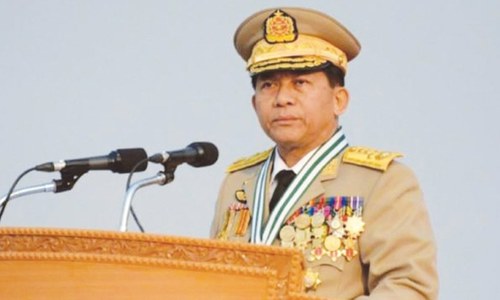YANGON: Myanmar’s civilian leader and Nobel peace laureate Aung San Suu Kyi will head up a delegation to the UN’s top court to defend a case accusing the mainly Buddhist country of genocide against Rohingya Muslims, the government said on Wednesday, a decision that blind-sided observers.
West African nation Gambia is due to open its case before the International Court of Justice (ICJ) in December on behalf of the 57 member states of the Organisation of Islamic Cooperation.
The complaint accuses Myanmar of breaching the 1948 UN Genocide Convention through its brutal military campaign in 2017, which targeted the Rohingya minority in Rakhine state.
In the opening hearings, the small, majority-Muslim African country is expected to ask the court to make an emergency injunction to protect the Rohingya, pending a decision on whether to deal with the wider case.
But Suu Kyi will personally lead a team to The Hague to “defend the national interest of Myanmar,” her office said. Myanmar has also retained prominent international lawyers, it added. The country has repeatedly justified the crackdown on the Rohingya as necessary to stamp out militants and insists its own committees are adequate to investigate allegations of abuse.
Some 740,000 Rohingya were forced to flee into sprawling camps in Bangladesh after the brutal 2017 military crackdown, in violence that United Nations investigators concluded amounted to genocide.
The case will be the first international legal attempt to bring Myanmar to justice over the Rohingya crisis, and is a rare example of a country suing another over an issue to which it is not directly a party.
The ICJ was set up in 1946 after World War II to adjudicate in disputes between UN member states.
Gambia’s effort is one of several legal challenges mounting against Myanmar.
The International Criminal Court — another Hague-based court set up in 2002 to probe war crimes — last week authorised its chief prosecutor to launch a full investigation into the persecution of the Rohingya.
Myanmar has not signed up to the ICC and therefore rejects its authority.
But the probe says it can be held responsible for crimes that affect neighbouring Bangladesh, which has signed up to the court.
Rights groups have meanwhile filed a separate lawsuit over the Rohingya in Argentina in which Myanmar’s former democracy icon Sun Kyi was personally named.
This is under “universal jurisdiction”, a legal principle which holds that some crimes are so horrific, they can be tried anywhere.
Independent Yangon-based analyst David Mathieson said the decision for Suu Kyi to lead the defence team personally was certainly a shock but he thought it “could potentially be positive”.
“(She) should use the trip to absorb this information, not just denounce accountability measures as undue pressure on Myanmar,” he said.
The former rights champion, widely condemned in the West for failing to stand up for the Rohingya, still enjoys overwhelming support at home where many buy the official line that the Rohingya are illegal immigrants.
Published in Dawn, November 21st, 2019














































